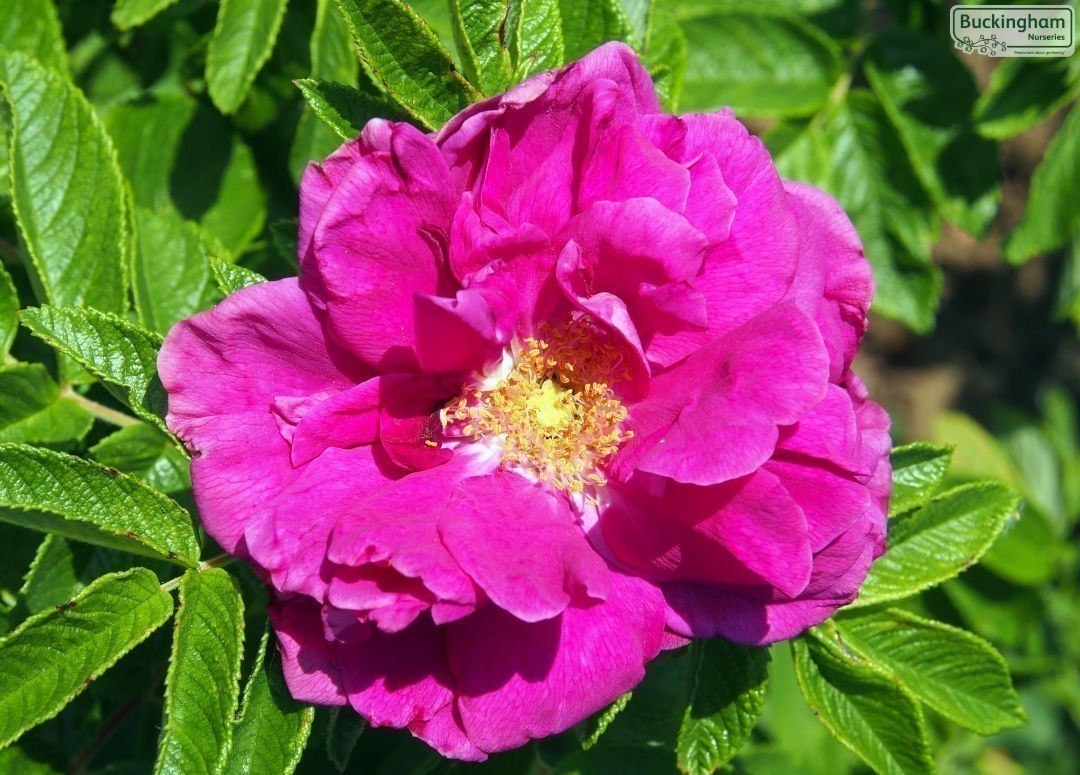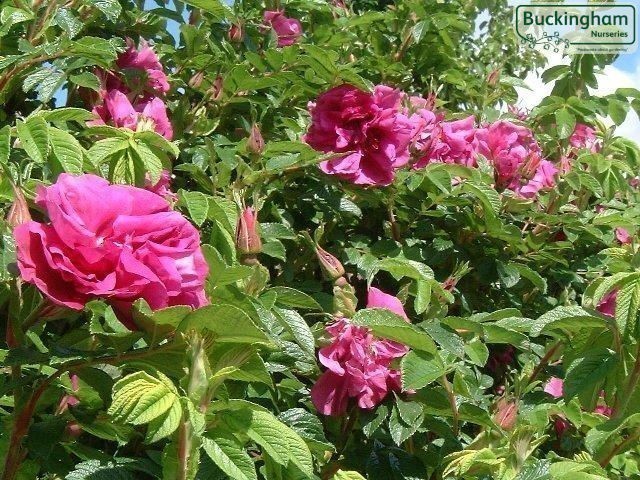Rose, Hansa
Rosa rugosa Hansa
-
Plant Types & Availability - More information
Tr = Bare Root Transplant (see Hedging section), Pg = Pot Grown (see Hedging section), Rw = Root-Wrapped
All prices include VAT at 20%.
A shrub rose with very fragrant, fully double, well-formed crimson-purple flowers throughout the summer on dense fast growing deciduous plants covered with small bristly thorns. Large red hips in autumn which are good for rose-hip syrup or excellent bird food in winter. Introduced in 1865. Also available as a bare root rose in our hedging section.
HEDGE Trim as necessary in winter. For hedges 120 - 150cm (4 - 5ft). Plant 30 - 60cm (2 - 3ft) apart.
SHRUB 1.5 x 1.2m (5 x 4ft).
Save 10% on this plant when collecting from the Garden Centre - discount will be automatically applied when Click and Collect is selected - click here for more details.
Rose, Hansa is available as:
Tr = Bare Root Transplant (see Hedging section)
Pg = Pot Grown (see Hedging section)
Rw = Root-Wrapped
Bare-Root Plants (Transplants)
Bare-root plants are sold without a pot/soil around the roots. This is a more cost effective and environmentally friendly way of growing plants. To ensure the best plant health we do not store our plants in cold storage, but they are left in our field or plant beds until they are ready for packing or collection.
Transplanted plants have been lifted from the ground and replanted. This encourages a better fibrous root system and makes the plant stronger and bushier.
Pot Grown Plants
These are normally sold in small 9cm wide pots, unless a different pot size is shown (where the pot size is shown in litres). Pot grown plants can be planted at any time of the year.
Root Wrapped Plants
These are field grown plants that have been planted in a polythene pot or wrap. They are normally available from November to May.
Availability
Pot Grown are generally available all year. Bare rooted plants are only available when the plants are dormant (typically from late November to March). Root wrapped plants are generally available from late November to May.
If a plant is currently out of stock because it is out of season (for example, bare rooted plants in summer) or we have sold out but we are expecting more to be available you can pre-order the plant. We only charge credit/debit cards when an order is despatched, not when an order is placed.
Planting Distances for planting as a Hedge
We recommend planting Rose, Hansa in a single row between 30cm/12ins apart and 60cm/24ins apart:

Planting closer will mean the plants will grow together and form a hedge quicker, but requires more plants.
To calculate the number of plants needed for a length of hedging, click on Planting Distance Calculator above.
Planting Guide & RootGrow
We recommend planting with RootGrow. The recommended amount for RootGrow for an order will be shown in your shopping basket.
We will send out a planting guide with your order, you also can find a guide to planting here.
Pruning
Hedging - As a general rule, plants grown for hedging need pruning to encourage side branching. Usually the harder a plant is pruned the bushier it will be. If they are not pruned there is a danger that the hedges will be thin and bare at the base and that the tips of the plants will die back. If the plant is naturally bushy, less or sometimes no pruning will be needed to achieve a dense hedge.
Rose, Hansa: Prune any straggly or untidy shoots, otherwise no immediate pruning is required.
Planting your roses
 Our root-wrapped roses need to be unpacked from the box then placed in a well-lit, bright, cool position with as much light as possible as soon as they arrive. If you are not able to plant them when they arrive for example, if you have frosty or over-wet soil, keeping the roots in their polythene bag, store the plants upright outdoors in a tray/box where you can look after them. Generally they are hardy, but in the case of severe frost or cold winds, you can protect them temporarily with some horticultural fleece. Wait until the soil conditions improve before planting.
Our root-wrapped roses need to be unpacked from the box then placed in a well-lit, bright, cool position with as much light as possible as soon as they arrive. If you are not able to plant them when they arrive for example, if you have frosty or over-wet soil, keeping the roots in their polythene bag, store the plants upright outdoors in a tray/box where you can look after them. Generally they are hardy, but in the case of severe frost or cold winds, you can protect them temporarily with some horticultural fleece. Wait until the soil conditions improve before planting.
The right location
Roses do best in an open, sunny position, set away from trees or large shrubs.
Soil matters
You get the best results by planting roses in a well-drained, reasonably fertile soil. Work generous amounts of well-rotted manure, garden compost or Tree, Shrub & Rose Planting Compost so they can get off to a good start. Work some bone meal into the soil as you are preparing it. To encourage stronger growth, or where you have previously grown roses before, apply friendly-fungi Root Grow to the roots to give them an extra good start.
Planting guidelines
You can plant roses provided the soil is frost free and clear of all weeds, especially all roots of perennial weeds. Once the soil is improved, you can plant your rose. Remove the rose from the packaging and plunge the roots into a bucket of water for around 10 - 15 minutes (never longer than three hours) to ensure full hydration.
Take out a good planting hole, that is large enough to accommodate the rose in their full extended position. Then work in the fertiliser (bone meal) into the soil. Apply the RootGrow either to roots or apply at the base of the planting hole just before positioning the plant. The rose should always be planted so the graft union is buried beneath the soil, around 5 - 10cm (2 - 4ins). If you intend to apply a generous mulch around the rose bush, then do allow for this with the planting depth. We would recommend mulching as this retains moisture and suppresses weeds.
Infill the planting hole with the improved soil mix lightly firming as you go along. The roses are supplied pre-pruned, but should you come across any damaged or broken shoots or roots, please remove these using secateurs.
Complete by adding the mulch, then water the rose in straight away after planting to help settle soil around the roots: about one gallon of water per rose should do the trick.
After care tips
Frosty weather can ‘lift’ newly-planted roses, so check they have stayed firm, and tread in if necessary. If conditions are at all dry apply plenty of water from March onwards, especially to any that are slow to form leaves. In spring apply some rose fertilizer, such as Toprose, to help boost growth and stimulate strong flowering stems and blooms.
The best way to keep the three major rose problems (aphids, black spot and mildew) at bay is by preventative spraying. Apply RoseClear Ultra on a regular basis; please follow the recommendation on the packaging for best results.
During their first growing season it is essential to maintain a good watering régime throughout the growing season.





